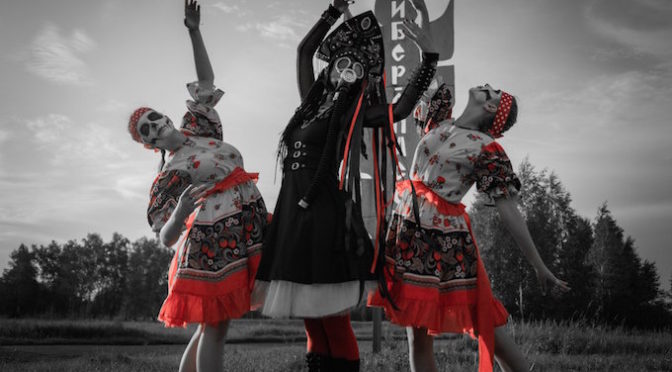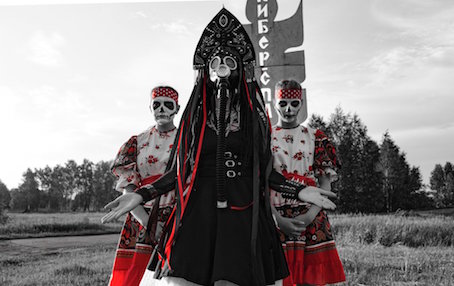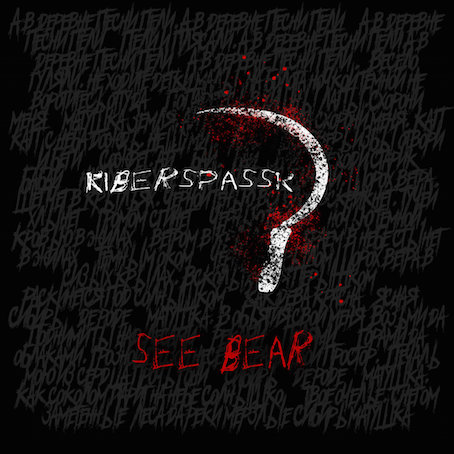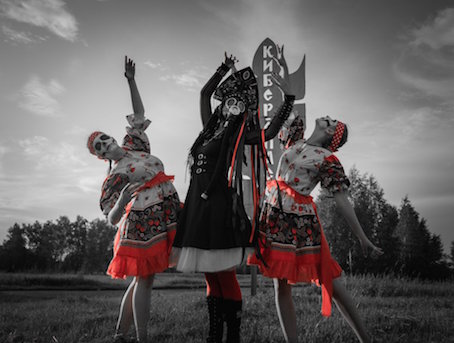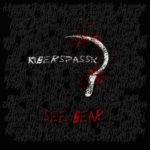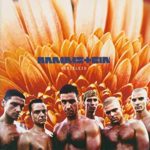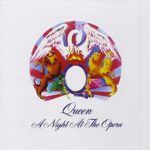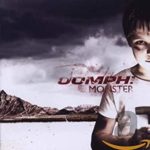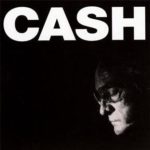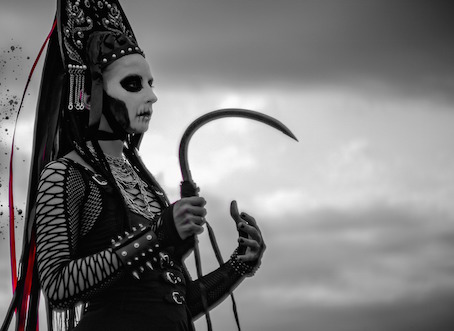EXCLUSIVE: INTERVIEW WITH KIBERSPASSK OF BABA YAGA !!
“See Bear” Is a Song About My Homeland, My Native Land. A Song About The Pristine Beauty And Greatness Of Siberia. I Am Very Inspired By The Pure Siberian Nature, Endless Expanses And a Huge Blue Sky.”
DISC REVIEW “SEE BEAR”
「”See Bear” (シベリアとかけている) は、私の祖国、生まれ育った土地についての歌よ。シベリアの原始的な美しさと偉大さを歌った曲。私は、純粋なシベリアの自然、果てしなく広がる大地、大きな青い空にとても刺激を受けているの。愛するシベリアをありのまま見せたかったの」
生い茂る針葉樹林、見渡す限りの永久凍土、そして果てのない空。シベリアのタイガに訪れる長い夜を、KIBERSPASSK はハードなダーク・エレクトロで語り、音とし、世界へと発信します。凍てつく寒さと闇の帳には、ひりつくようなインダストリアルとロシアの厳粛なフォークロアを組み合わせたユニークな音化粧がよく似合います。
「私は NYTT LAND という、世界的にもかなり有名なバンドをもう一つやっていて、そこではシャーマニックなダークフォークを作り、古代楽器を演奏し、シベリアのタイガにおけるシャーマンの歌を歌っているのよ。だから、KIBERSPASSK は、私の別人格なの」
冬にはマイナス30℃を超える極寒の地。カザフスタンから100キロ、アルタイ山脈の麓にひろがる西シベリアの草原がバンドの故郷です。そんな場所で Baba Yaga こと Natalya Pahalenko と夫の Anthony はカンテレやタルハルパという古の楽器を操り、北欧神話やシベリア先住民のシャーマンから薫陶を受けた “シャーマニック・ダークフォーク” を奏で世界的な成功を納めます。KIBERSPASSK とはそんな彼らのシベリアという厳しくも美しい環境に特化した別人格。今にも “死にかけた” 村の名前を抱きながら。
「私はずっと自分のやり方でボーカル・テクニックに取り組んできたわ。主な方向性は、伝統的なロシアのフォーク・ボーカル、北欧のヨイク (サーミ人の伝統歌唱) 、トゥバ共和国の喉歌よ」
KIBERSPASSK の特別な音楽の核となるのは、間違いなく Baba Yaga の歌唱です。Baba Yagaはその名の通り異能の力を持つ魔女でシャーマンかもしれません。ヨイクで天使のメロディーに荒々しい異教の呪いの声をかけたり、ホーミーで草原や森林に邪教の声を響き渡らせるのですから。そしてその歌声は、MINISTRY を想起させる攻撃的で無機質なインダストリアルの背景に独特の夜と自然、呪術的アトモスフィアをもたらすのです。
「シベリアの先住民族のフォークロアも同様だけど、ロシアの伝統音楽は私たちの祖先の精神的・文化的遺産のルーツを保存する非常に深い階層なの。本物の感情と個性を持った、とても美しく壮大な音楽よ。とてもインスパイアされるわ。私はもともと歴史家で、自分の土地の歴史や神話を研究し、古代の人物を自分の歌の中で蘇らせることが好きなのだから」
インスピレーションの源は、シベリアの環境や景色はもちろん、スラブ神話の暗黒面にまで及びます。キキーモラ (働き者の願いを叶え怠け者を喰らう幻獣)、ドモヴォーイ (家族を守るため悪い精霊や侵入者の殺害も厭わない家の妖精)、バーバ・ヤーガ (森に住む妖婆。骨と皮だけにまで痩せこけて、脚に至ってはむき出しの骨だけの老婆の姿をしている。人間を襲う魔女のごとき存在)、リホ (小さくて毛深い生き物) など、ロシアの子供たちが生まれたときから知っているキャラクターたち。
古い集落が消えつつあるこの土地では、シベリアの精神と真の神秘性が保たれていて、今でも神話と現実の境が曖昧です。この地で生まれ、生活し、音楽を創造する KIBERSPASSK。だからこそ、その音楽に太古の息吹と孤高、霊妙、荘厳、超自然、そして奇々怪界を持ち込むことが可能だったのでしょう。革新がもはや珍しくなってしまったジャンルに、新鮮で厳しい寒風を吹き込みながら。
今回弊誌では、Baba Yaga にインタビューを行うことができました。MV に登場する印象的なダンサーは Pahalenko 夫妻のの娘さんとの情報も。謎が深まりますね。「Babymetal は実に興味深いバンドよ!彼女たちのショーとエナジーが大好きなの。そういった要素のいくつかは、おそらく KIBERSPASSK に影響を与えているわ」 どうぞ!!
KIBERSPASSK “SEE BEAR” : 9.9/10
INTERVIEW WITH BABA YAGA
Q1: It seems you grew up in Siberia, right? How did you get into metal and rock there?
【BABA YAGA】: Yes, that’s right, the Kiberspassk project was born in Western Siberia. Me and my husband was born here and here we live and create our music.
I am not entirely aware of the metal and rock reality of Siberia, since we ourselves live in a small village where there are no clubs and bands (except for our bands), and we tour and travel outside of Russia. In this regard, it’s easier for me to talk about the European metal scene than the Siberian one. In fact, the Siberian scene is very local and closed, since there are very long distances between cities and the touring infrastructure is poorly established.
Q1: あなたはシベリアで生まれ育ったそうですが、ロックやメタルはシベリアで人気なのでしょうか?
【BABA YAGA】: その通りよ。KIBERSPASSK プロジェクトは西シベリアで生まれたの。私と夫はここで生まれ、ここで生活し、音楽を作っているのよ。
私たち自身は、クラブやバンド(私たちのバンドを除く)も存在しない小さな村に住んでいて、ロシア国外でツアーを行い旅をしているから、シベリアのメタルやロックの現実についてはまったく知らないのよ。この点では、シベリアのメタルシーンよりもヨーロッパのメタルシーンの方が話しやすいわね。
まあ実際、シベリアのシーンは、都市間の距離が非常に長くて、ツアーのインフラも確立されていないから、非常にローカルで閉鎖的だと思うわ。
Q2: How did Kiberspassk come to be? What’s the meaning behind your band name Kiberspassk?
【BABA YAGA】: Kiberspassk was originally born as my desire to create music that would not be limited by any genre framework. I have a another one band called NYTT LAND, a fairly well-known band in the world, in which we create shamanic dark folk, play ancient musical instruments and sing songs of the shamans of the Siberian taiga. And Kiberspassk is an alter ego. My alternate musical reality. I started writing the first songs for Kiberspassk 2 years ago during one of the tours with NYTT LAND. And it seems it was in the French city – Nantes.
And a year ago, when the pandemic closed the borders and put the touring life on a long pause, I decided that the time had come for the implementation of this project, and so Kiberspassk was born.
The name Kiberspassk is the name of an old dying village located just 15 kilometers from our house.
Q2: KIBERSPASSK 結成の経緯を教えていただけますか?
【BABA YAGA】: KIBERSPASSK はもともと、ジャンルの枠組みにとらわれない音楽を作りたいという思いから生まれたの。私は NYTT LAND という、世界的にもかなり有名なバンドをもう一つやっていて、そこではシャーマニックなダークフォークを作り、古代楽器を演奏し、シベリアのタイガにおけるシャーマンの歌を歌っているのよ。
だから、KIBERSPASSK は、私の別人格なの。私のもう一つの音楽的現実なのよ。KIBERSPASSK のために曲を書き始めたのは2年前、NYTT LAND のツアーの時だったわ。それたしかあれは、フランスの都市、ナントでのことだったと思うけど。
そして1年前、パンデミックで国境が閉ざされ、ツアー生活が長い間休止していた時、このプロジェクトを実行する時が来たと判断し、KIBERSPASSK が誕生したの。
KIBERSPASSK という名前は、私たちの家からわずか15キロのところにある、古くて死にかけの村の名前なの。
Q3: Your singing is very unique and attractive. What kind of singers have you taken as your role models?
【BABA YAGA】: I working on my vocals technique myself. The main directions in which I work are traditional Russian folk vocals, North European joik and Tuvan throat singing. I like to mix these vocal styles in my music. It is important for me to create my own sound, without much looking back at someone. But to some extent, I can call the performers of Russian folklore, the keepers of tradition, my role models.
Q3: あなたの歌唱はとてもユニークで魅力的ですね。どういったシンガーに影響を受けてきたのでしょう?
【BABA YAGA】: 私はずっと自分のやり方でボーカル・テクニックに取り組んできたわ。主な方向性は、伝統的なロシアのフォーク・ボーカル、北欧のヨイク (サーミ人の伝統歌唱) 、トゥバ共和国 (ロシア連邦を構成する共和国の一つ) の喉歌よ。
自分の音楽の中でこういったボーカルスタイルをミックスするのが好きなの。私にとって重要なのは、誰かを手本とすることなく、自分のサウンドを作ることだから。だけどある程度は、伝統を守るロシアン・フォークロアの演奏者たちを、私のロールモデルと呼ぶことができるでしょうね 。
Q4: I thought it was Mongolian throat singing, but it was Tuvan throat singing, right?
【BABA YAGA】: I can say that this is practically the case. I use a Tuvan style of throat singing called “kargyraa”. In general, if we talk about throat singing, the Tuvan and Mongolian sounds are almost identical, since Tuva borders Mongolia and throat singing is their common cultural heritage and treasure. In Siberia, many people and indigenous people practice throat singing, so there is no particular difficulty in learning it, as it is part of our traditional culture.
The “kargyraa” style, in which I sing, is more of a masculine style, since the female vocal apparatus is not always ready for such serious loads that a person receives during training. But with careful practice, anything is possible.
Q4: 私は地理的にも、モンゴルのホーミーだと思っていたのですが、トゥバの喉歌だったんですね?
【BABA YAGA】: 実際には、モンゴルのホーミーとも言えるわね。まあでも私が使っているのは、トゥバの「カルギュラー」という喉歌のスタイルよ。トゥバはモンゴルと国境を接していて、喉歌は彼ら共通の文化遺産で宝物なのよね。一般的に喉歌といえば、トゥバとモンゴルの音はほとんど同じだし。
シベリアでは、多くの人、それに先住民が喉歌を練習しているから、伝統文化の一部である喉歌も習得することに特に困難はないの。私が歌っている「カルギュラー」というスタイルは、どちらかというと男性的なスタイルなのよ。
というのも、女性の声帯は、トレーニング中に受けるような深刻な負荷に耐えられるとは限らないから。まあそれでも、慎重に練習すれば何でも可能よ。
Q5: What do you think about the musicality of Kiberspassk? Metal? Rock? Folk? Industrial?
【BABA YAGA】: Musically, I think it’s a mix between industrial metal and electro-folk. In fact, I just write the way I want, without limiting myself to borders. It’s just that industrial and folk are very close to me, I’ve listened to this kind of music since childhood, and probably this influenced the sound of Kiberspassk.
Q5: KIBERSPASSK の音楽性についてはどう考えていますか?メタル?ロック?フォーク?インダストリアル?
【BABA YAGA】: 音楽的には、インダストリアル・メタルとエレクトロ・フォークをミックスしたようなものだと思っているわ。実際のところ、私は国境に縛られることなく、自分の好きなように作曲しているの。
ただ、インダストリアルとフォークは私にとって非常に身近なもので、子供の頃からこういった音楽を聴いてきたし、おそらくそれが KIBERSPASSK のサウンドに影響を与えているとは思うわ。
Q6: I’ve seen the video for “Kikimora”, and I’m sure it will remind some listeners of Babymetal in Japan. How do you feel about them?
【BABA YAGA】: Babymetal is a very interesting band, I like their show and energy. Perhaps some show’s elements also influenced Kiberspassk.
Q6: “Kikimora” のビデオを見ましたが、日本の Babymetal を想起するリスナーも多いでしょうね?
【BABA YAGA】: Babymetal は実に興味深いバンドよ!彼女たちのショーとエナジーが大好きなの。そういった要素のいくつかは、おそらく KIBERSPASSK に影響を与えているわ。
Q7: Russian folk music plays an important role in your music, right? Its mystique is sometimes connected to Heilung and Wardruna, would you agree?
【BABA YAGA】: I totally disagree about Wardruna and Heilung. I don’t understand what these bands have to do with it. They have nothing to do with Russian folk music.
Russian traditional music, as well as the folklore of the indigenous peoples of Siberia, is a very deep cultural layer that preserves the roots of the spiritual and cultural heritage of our ancestors. This is very beautiful and epic music with real emotions and character. She is very inspiring. I am a historian by education and I like to study the history and mythology of my land, to revive ancient characters in my songs.
Q7: フォーク・ミュージックという意味では、最近北欧で大人気の HEILUNG や WARDRUNA と通じる点もありそうですが?
【BABA YAGA】: HEILUNG と WARDRUNA については全く同意できないわね。これらのバンドと何の関係があるのか理解できないわ。だって、彼らはロシアの民族音楽とは何の関係もないんだもの。
シベリアの先住民族のフォークロアも同様だけど、ロシアの伝統音楽は私たちの祖先の精神的・文化的遺産のルーツを保存する非常に深い階層なの。本物の感情と個性を持った、とても美しく壮大な音楽よ。とてもインスパイアされるわ。
私はもともと歴史家で、自分の土地の歴史や神話を研究し、古代の人物を自分の歌の中で蘇らせることが好きなのだから。
Q8: Please tell us about the concept and theme behind “See Bear”.
【BABA YAGA】: “See Bear” is a song about my homeland, my native land. A song about the pristine beauty and greatness of Siberia. I am very inspired by the pure Siberian nature, endless expanses and a huge blue sky.
We live in the steppes of Western Siberia, just a hundred kilometers from the border with Kazakhstan and a couple of hundred kilometers from the ancient Altai mountains.
The video for the song was filmed in winter, it was very cold, about -25 degrees Celsius and wind, and had to be filmed in a light dress and with an open head. The wind is especially felt in the steppe. But I am glad that we did it, that was the idea – to show our Siberia as it is and as we love it.
Q8: 最後に、”See Bear” のコンセプトやテーマについてお話ししていただけますか?
【BABA YAGA】: “See Bear” (シベリアとかけている) は、私の祖国、生まれ育った土地についての歌よ。シベリアの原始的な美しさと偉大さを歌った曲。私は、純粋なシベリアの自然、果てしなく広がる大地、大きな青い空にとても刺激を受けているの。
私たちは西シベリアの草原に住んでいるの。カザフスタンとの国境からわずか100キロ、古のアルタイ山脈からは数百キロのところよ。
この曲のビデオは冬に撮影したの。マイナス25度くらいの風が吹くとても寒い中、薄手のドレスを着て、顔を出しながら撮影しなければならなかったわ。特に草原では風が強く感じられるの。でも、やってよかったと思っているわ。私たちの愛するシベリアをありのままに見せるというアイデアだったから。

